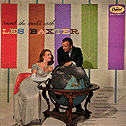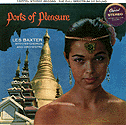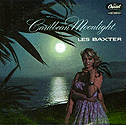with James Call and Peter Huestis
|
1. Peter Huestis - One of the things James and I are most curious about is that there has been big resurgence of interest in interesting and unusual music from the past, and a big resurgence of interest in your music in particular. What we were wondering was were you aware of that fact?- Les Baxter - I don't think the record company is aware of it. Because they just bury my albums and don't release them. James Call - Capitol? - LB - Yeah. People would be happy to buy them if they were available. JC - Are there any plans for re-issuing any of the records or a compilation?- LB - Do you feel like calling Capitol Records? JC - Yeah! (laffing) I sure do! LB - Tell 'em there's a great resurgence of interest in my music. And don't just talk to one person because you might get the wrong guy. Maybe you can get something re-released. There are lot of good albums there. I made over 50 albums. JC - We were wondering if you had some discography ... LB - I don't have a thing. JC - Well, this [Baxter] stuff we find in thrift stores. And you run into them really frequently. PH - Not frequently enough. JC - Not frequently enough but over the years--well ... PH - I've been seeking your records for a good, well ... I think the first one I bought was probably ... 19 ... 82-83, and I've been seeking them ever since. And this is all I've found, which isn't very many. LB - You've got a lot of albums there. JC - You've got what? 12 did you say? PH- 12 or 13. JC - I've got 12 or 13, too. LB - Do you have ... uhh ... let's see, it's with the chorus ... Oh dear. It was a wild African thing with a choir. PH - TAMBOO ? LB- No. TAMBOO and RITUAL ... I know you have. JC - (laffing) Yes. PH -THE SACRED IDOL? LB - Possibly. THE SACRED IDOL was the one. Yeah. THE SACRED IDOL, and there was another ... very passionate ... PH - Well, let us show you some of what we have. Here I've got AROUND THE WORLD WITH LES BAXTER.  LB - Let me tell you something funny about the cover. My wife ran into the model who was on the cover. She said, "Oh, I did a cover with your husband." She said, "Fine, did you like the album?" She said, "Oh, I didn't hear the album. I just saw the cover." PH - The model said that? LB - Yeah. She said, "I just saw the cover." Such stupidity. JC - Well, she's on the cover. PH - Yeah ... Well, I've got RITUAL OF THE SAVAGE here, of course. LB - I love that one. That cover ... PH - I think this one is my favorite album of yours, as well. Now Martin Denny basically ended up doing every single song on this. LB - Yes! JC - Now was that by arrangement with you? LB - No. He just did it and he did it with malicious aforethought. Fortunately it didn't hurt me because I got royalties on it, you know. So I didn't sue him or get mad at him but for years he took credit for writing them, Quiet Village and some of the stuff. We finally stopped him from saying that. JC - No kidding! PH - I do like Martin Denny but I think it's pretty safe to say that he wouldn't have had a career if it hadn't been for your song writing. LB - (chuckling) That's absolutely true. PH - It's real obvious. Every Martin Denny album... LB - It's still cocktail piano. I don't know how you could like it all that much, you know. JC - The guy who's talking in that article I showed you earlier [The Millionaire from Combustible Edison] had an interesting thing to say about that, [Denny] his focus was so narrow, so specific. LB - Well, that's the secret of commerciality, a simple style and you stick with it. JC - And that's what he did. He didn't stray--in fact, several of his people [musicians], Julius Wechter, Arthur Lyman ... PH - They went on to do more interesting things. LB - Uh, Wechter was the arranger for Herb Alpert. And Herb Alpert said, "Give me a Les Baxter side." So he gave him the bolts which built a record company. JC - A&M. LB - Yeah. What have you got there? [looking at a record Peter is holding] PH - I've got THE SACRED IDOL here. This is a big favorite of mine, as well. LB - I'm glad because I like that a lot. You realize that, I think that on one side is the conquistadors, the Spanish. I don't know if it even says that there. PH - Yes, [looking at the back] side two, conquistadors. LB - That was when the Spanish came in and conquered the Aztecs. I thought that was a clever thing. JC - What I really like and what really came across to me as the feel of that album was the fact that the chorus doesn't sing words; it's all ooohs and ahhhhs and... LB - All ooohs and ahhha and grunts! [all laff] PH - This was a motion picture soundtrack, THE SACRED IDOL? LB - Some one--this is so complicated--some one sent me to Mexico City to score a film that they were doing in Mexico. And then they didn't release the film in Mexico They came back here. I wrote the thing in a hotel room, with no piano. I just wrote the whole score in a hotel room in Mexico City. I came home, then at some later date they decided to release the picture. Really weird thing. And I thought the music was so good that I put it in an album. PH - Ahhh, I think you were right there. JC - We never, uhh... we were discussing we'd never heard of the film. PH - We were both saying how much we'd like to see a film with music like that. LB - I don't think you'll ever see it.  PH - That's a shame. PORTS OF PLEASURE here. This doesn't strike me as being one of your more complicated efforts. LB - What do you mean, "more complicated"? PH - Well, it doesn't strike me as having quite the sort of vigorousness of some of the other ones like THE SACRED IDOL. LB - It isn't exotic like that; it's piano. However, I have had friends--head of music at one of the studios--said it's the best stereo album that he'd ever heard. PH - The stereo on most of these is beautiful. LB - It has a wide, wide range of, you know, bells and gongs and things. JC - My understanding is that in the 50s Capitol's recording studio was state of the art for the industry. LB - I never felt that. As a matter of fact, I insisted on going to another studio PH - How involved were you in the technical aspects of your recordings? The choosing of equipment--did you help to develop any new recording techniques? LB - Well, I did a little bit, yeah--in terms of set-up and so forth. But no, not much. I was very determined in dominating in my work, but they were all good people there.  PH - CARIBBEAN MOONLIGHT. This album I like quite a bit. LB - That is one of my favorites. Oh god, I've gotta have a copy of this album. It is so exotic. They're standard songs. The arranging is so exotic in that. I just love this album. PA - This is one that I thought from the cover would be more of a lush, romantic type of album. But when I listened to it I was real surprised at how exotic it was. This is one of my favorites. [holding up another] This is a collection. "Capitol record club exclusive!" Sort of a mish-mash. It has one song from SKINS on it. And one song from here and one song from there. Sort of take them out of context. [now holding up BROADWAY '61]
|
Return to Les Baxter Index
